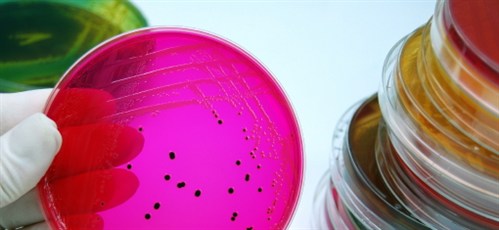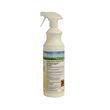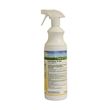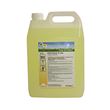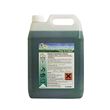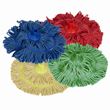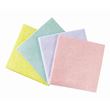Use cleaning supplies to combat Salmonella
03 November 2011
Salmonella is a bacteria usually found in the intestines of animals and birds, it can be transmitted to humans through contaminated foods - the effective application of cleaning supplies and food hygiene can help to guard against the bacteria.
If contracted it can cause serious illness within the digestive system, however in more severe cases it can go on to survive and grow in the spleen, liver, and other organs possibly even entering the blood stream.
The onset period can be anywhere between 6 hours and 72 hours, with symptons lasting between one and seven days depending upon the severity of the illness - the elderley, children and those with weakened immune systems are the most vulnerable.
Petri dish with cultured salmonella
Salmonella is contracted when the bacteria is ingested through contaminated foods, the bacteria can be found on almost any food type. Outbreaks have related to raw and uncooked meats and poultry, fresh vegetables and fruit, unpasturised milk, water, egg products - often resulting in huge product recalls once an outbreak source has been identified.
Symptoms of Salmonella
- Nausea
- Vomiting
- Diarrhea
- Abdominal pain
- Fever
- Headache
- Chills
-
Muscle pains
Cleaning supplies & food hygiene
Basic food hygiene together with the correct use of appropriate cleaning supplies can reduce the risk of contracting the illness. Not all bactericidal cleaning products are effective against Salmonella and so the first thing to do is check your cleaning supplies cupboard and look at the labels on your sanitiser cleaner.
Our sanitiser concentrate is an excellent quality sanitiser capable of killing a broad spectrum of pathogens. Simply spray on to the surface to be cleaned or use a solution to soak items in, for example chopping boards as this will allow the solution to fully contact with all the surfaces to be sanitised ensuring a higher bug kill.
A sanitising cleaning product should be used on a regular basis to clean surfaces within the kitchen including work surfaces, sinks, taps, doors & handles, light switches, refrigerators - interior/exterior, microwaves, tiled splashbacks, floors and all washable surfaces.
Reducing your risks
Particular care should be taken when handling food and below are a few tips to help minimise the risk;
- Ensure that a different knife is used for preparing various foods - this will help prevent cross contamination
- Wash your hands before preparing/handling/eating food
- Wash your hands when you switch to preparing a new food
- Sanitise the surface you are working on after each food has been dealt with
- Ensure that towels are clean or use disposable paper such as standard centre feed this will cut the risk of cross contamination
- Store perishable foods in the refrigerator at the first opportunity as bacteria grows very fast at room temperature
- Starting at the supermarket through to the refrigerator - keep uncooked meat and poultry away from fruit, vegetables, cooked meats and ready made meals
- Never eat undercooked or raw eggs
- Ensure that meat and poultry are thoroughly cooked before eating - meat or poultry pink in the middle carries a higher risk
- Always defrost your food in the refrigerator
- Wash fruit or vegetables before eating
- Ensure that the eggshells you come into contact with are thoroughly washed - they may contaminate the egg when cracked open
- Try using pasturised egg products.
- Avoid unpasturised milk and cheese
-
Always wash your hands after handling pets
Cross contamination
Being aware of the common risk factors can help reduce instances of cross contamination especially between uncooked and cooked foods. Cross contamination can happen when;
- Raw food drips onto cooked foods
- Touching raw foods with fingers and going on to handle cooked foods
- Equipment or surfaces contaminated with raw meat and then touched with cooked food or even touched with fingers which go on to contact with cooked food
Regular hand washing with soap (ideally a bactericidal liquid soap) will reduce the incidents of cross contamination. Regular use of bactericidal cleaning supplies will keep surfaces clean and sanitised providing a safe environment in which to prepare food.



